TWENTY PREDICTIONS FOR THE NEXT 20 YEARS
FAST COMPANY EDITOR ROBERT SAFIAN CELEBRATES THE MAGAZINE'S 20TH ANNIVERSARY BY LOOKING FORWARD.
The doctor handed me the scissors. As I pressed down the blades, snipping the umbilical cord, I looked up at my wife. She was smiling, holding our newborn son.
That was 20 years ago. Our baby is now 6 feet tall and a junior in college. When I look at him, I see all the stages of his life in one continuum, the toddling and the tantrums, the laughs and the arguments, the late nights coaxing a crying infant to sleep and waiting for a teenager to come home.
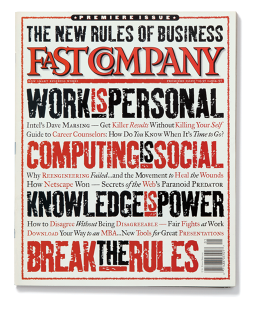
Fast Company turns 20 this month too, and the world has changed dramatically since the cover of issue No. 1 declared "Work Is Personal. Computing Is Social. Knowledge Is Power. Break the Rules." Yet that manifesto is more relevant than ever. How we interpret those words has evolved—we did not predict an App Store or an Oculus Rift—but their spirit has become central to our culture
We celebrate birthdays to remember all that has gone before, and also what is to come. This month, with issue No. 201, we recognize Fast Company’s 20th anniversary by looking toward the future. The dynamic change of the past two decades is just a warm-up for what is still to come.
I talked recently about this with CEO Hans Vestberg of the Swedish communications company Ericsson. Because Ericsson builds products for the major telecom providers and cell-phone makers, as well as hundreds of governments around the globe, Vestberg has inside knowledge of everybody’s plans—information he cannot specifically reveal but that informs his thinking about where our world is trending.
"Today, there are 7.2 billion mobile subscriptions," he says, "and only 2.9 billion people have broadband," by which he means high-speed Internet access. "But as technology advances, prices will fall. By 2020, 90% of the world’s population will be covered by mobile broadband networks. Another five to 10 years further, broadband will have universal reach."
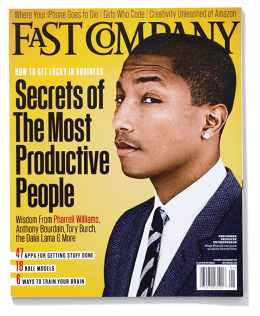
This, Vestberg argues, will have a transformative impact. He points to a historical precedent that is now hundreds of years old: the steam engine. When first invented, its function was to remove water from mines. Only later was the technology applied to other arenas, spawning steamships and railroads and turbocharging industry. The advent of connected mobile technology is just as powerful and equally underestimated, Vestberg says. We are still in the early stages, with implications for health care, education, banking, energy, manu-facturing, and more. "Our imagination is our limitation," he says.
Vestberg’s predictions of transformation are echoed by those on the frontier in other disciplines: genetics, alternative energy, artificial intelligence, and so on. If you travel down the likeliest development paths in each of these areas and then wrap all the advances into one future, you see that we are at a dramatic inflection point.
I have used the phrase Generation Flux to describe this era of transition. Because the changes are coming so fast, there is a rising premium on our ability to adjust, to be adaptable in new ways. This can be scary for some, but it is also undeniably exciting, and for those prepared to embrace this emerging reality, the possibilities are tantalizing.
What follows are 20 observations that we believe will hold fast in the years ahead. They are predictions and, as such, are fraught with limitation and supposition. None of them, on their own, is shocking. That is by design. In combination, though, they outline a world of tomorrow where work is still personal, computing is still social, and knowledge is still power. And where the rules for success will be ever-changing.

1. Speed Will Triumph.
The best soccer teams in the world emphasize pace of play over perfection. They recognize that keeping the ball moving quickly is better than waiting and trying to make the ideal pass. As deputy editor David Lidsky explains in the first of our"Moments That Matter," speed emerged as a business imperative in 1995 with the meteoric rise of Netscape, and it has become even more central in the years since. Constant iteration and redefinition are central features at businesses from Amazon to Google to Netflix, and every industry is now required to embrace that pace. (The unanswered question: Which governments will learn to operate with this speed imperative?) Facebook may be the ultimate expression of iterative change, expecting new initiatives to be imperfect—and relentlessly improving them over time.
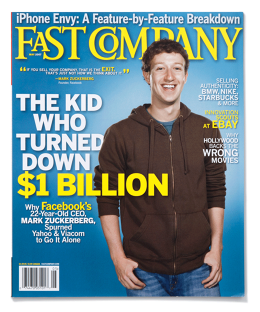
2. Mark Zuckerberg Will Lead.
When we called Zuckerberg "The Kid Who Turned Down $1 Billion" on the cover of ourMay 2007 issue, he was a baby-faced 22-year-old with just 19 million users. Today he’s still got that baby face, but as technology editor Harry McCracken reports in " ‘These Things Can’t Fail’ ", he has grown into an unparalleled leader. Now 31 years old, with nearly 1.5 billion customers across the globe, Zuckerberg is wildly successful yet still underestimated. He has relentlessly improved himself as a businessperson and continues to be focused on learning. This psychological feature, along with the fact that he has a net worth north of $30 billion and a controlling stake in a world-spanning enterprise, virtually guarantees that he will be a bedrock figure in our economic and cultural evolution for decades to come.
3. Malala Will Build.
After you’ve won a Nobel Peace Prize as a teenager, what’s next? Malala Yousafzai is answering that question by leveraging her global public image not simply to raise awareness of the educational needs of girls in the developing world, but also to orchestrate on-the-ground programs that will have tangible impact. What her nascent Malala Fund represents, she explains to contributing writer Karen Valby in" ‘It’s No Longer Just My Voice. It’s the Voice of the People’ ", is an ongoing effort to change societal expectations. Malala herself represents the leading edge of a cohort that is only just being unleashed: young talent growing up in obscure corners of the globe. This generation will increasingly have the tools and opportunity to redefine our world. Malala is just the beginning.
4. Elon Musk Will Inspire.
Whether Musk is the real-life incarnation of Tony Stark is not the point. Nor is the ultimate success of his enterprises: Tesla, SpaceX, and SolarCity (though we wouldn’t advise betting against them). What matters is that Musk’s ideas, and his example, are a catalyzing force for progress on one of the most devilishly complicated issues of our time: climate change. As the world’s population grows and the standard of living improves, we will produce more greenhouse gases, more pollution. Concerted, high-impact government action will not materialize unless there is a crisis. What remains, then, is a market-based solution, which is precisely what Musk is dedicated to instigating. In outlining his most audacious plans yet, Musk tells contributing writer Max Chafkin, " ‘The Issue With Existing Batteries Is That They Suck’ ". By exploiting that seemingly modest deficiency, Musk not only wants to build a bigger business, but also inspire us to address our biggest challenges.
5. Technology Will Improve the Human Condition.
Science fiction often depicts a dystopian tomorrow. But if you consider the long lens of history, technological advances have consistently improved people’s lives. We cannot forget the often cruel and rapacious things that have been perpetrated in the name of progress. Nor do we expect an end to the tragedies of natural disaster or disease outbreak, of war or terrorism. Whether by accident or overt design, nuclear, chemical, and biological threats remain constant. But it is also worthwhile to remind ourselves that fears of tomorrow have often been overblown. Perhaps the most telling statistic: Global life expectancy has climbed consistently over the centuries and in the past decade has improved for all regions of the world. That advance will continue unabated.

6. Digital Tools Will Unlock Opportunity.
Inequality remains rampant across the United States and around the world. The digital divide has often served to heighten the gap between the haves and have-nots. But rising mobile penetration offers the potential to shift that dynamic. When broadband smartphones achieve global ubiquity (as Ericsson’s Vestberg predicts), digital learning tools offered by Khan Academy, Duolingo, and others will transform opportunity in the developing world. The teachers and students of tomorrow will not be confined to classrooms, nor to the countries and cities that can afford them.
7. Democracy Will Be Digital.
Naysayers have given many explanations for why voting in the United States does not take place via the Internet: identity authentication, security, reliability. These concerns have all been overcome by businesses such as banks and retailers, and before long government will solve them as well. As a new generation of voters comes to the polls—a group raised on one-click purchases and instant access via apps—the traditional voting process will become untenable. New candidates will establish their credibility by extolling their technological sophistication,and e-voting will be everywhere.
8. Diversity Will Deepen.
Those controlling the halls of power in business and government in the United States remain predominantly male and white. This will not persist as our population becomes more heterogeneous. An increasingly diverse leadership will be more successful too: As the pace of change accelerates, we will face knottily complex problems, and the greater the variety of approaches and experiences available to tackle them, the better the likelihood of success.
9. Mission Will Trump Money.
Economists have long stressed the power of financial incentives. What’s measured is what matters; competition breeds excellence; you get what you pay for. It is all logical, yet in many circumstances it is coming up short. Recent real-world studies have shown that having a purpose associated with work produces better performance than pure financial reward. The next generation of workers will expect to be engaged in their jobs through more than just financial means.
10. DNA Will Be Unstoppable.
The decoding of the human genome has launched a wave of new treatments and approaches, as highlighted in "Our Body of Knowledge Expands". Inspiring as these examples are, though, the impact of genetic data is in its infancy.
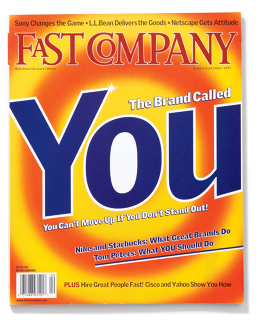
11. Medical Training Will Be Rewritten.
Modern doctoring begins with a boot-camp experience: endless days of unending shifts, as young interns are forced to ingest—and deliver—diagnoses with reflexlike expertise. As our library of medical knowledge expands beyond any doctor’s ability to retain all that information, the doctors of the future will have to become data interpreters, tapping into Watson-like technical tools to both diagnose conditions and optimize treatments. This transition promises to make health care more effective and, ideally, will allow doctors to focus even more on the important task of patient service.
12. Human Empathy Will Be Central.
It’s not just doctors who can improve their bedside manner. We can all stand to listen and respond with more sensitivity. In fact, as machine learning and artificial intelligence insinuate themselves more deeply into manufacturing and the workplace, the one arena that will never be usurped by technology is human-to-human communication.
13. Entrepreneurship Will Not Be for Everyone.
The ubiquity of ABC’s Shark Tank underscores just how appealing the entrepreneur has become in global culture. Everyone wants to start their own business, to launch their own Zuckerbergian success. Government leaders extol the virtue of the startup world, and more and more young people hope for a future where they can be their own bosses. There’s only one problem: Entrepreneurship is hard work that requires both high-intensity risk taking and a steel-stomach capacity for absorbing disappointment. Some people are psychologically suited for this roller coaster; many of us are not.
14. Bubbles Will Burst.
Is there a tech bubble? Can all those billion-dollar "unicorn" startups really be worth so much? Will investors who believe the hype ultimately end up getting burned? The answer to all three of those questions is "yes." Yes, there is a tech bubble in some places. Truth is, there is always a bubble somewhere. Some of those unicorns are really worth billions—and some are not. Some investors will get burned; others will get rich. Which is which? We’ll know once it happens. Talk of bubble versus no bubble is a distraction for most of us, a parlor game. When major bubbles burst, almost everyone is taken by surprise and even those who aren’t are generally upended nearly as much as the rest of us. What’s most important, once again, is remaining adaptable: If the arena you’re involved in turns out to be a bubble, it will be time to change arenas.

15. Simple Will Be More Difficult.
New technologies often rise on the promise of making everything simpler, better, and cheaper. Over time, we learn that they often do make things better—and even cheaper—but rarely do things remain simple for long. Consider the advertising marketplace, which once seemed pretty straightforward (network TV ads for all!), but marketers had limited knowledge of who saw their ads and how those prospects responded. Marketers can now target specific pools of customers and track their activity. Yet nothing about the modern ad world is simple: There are more avenues for reaching customers than ever, and managing a variety of social, web, and mobile programs makes the old days of TV’s hegemony seem quaintly appealing. Companies like Google contend that things will get easier, thanks to new analytics and programmatic marketplaces. More likely: The industry will become more effective at targeting the right message to the right person in the right way, but it will also be more complex.
16. Cybersecurity Will Be Costly.
Every company is a "tech company" today because we all use technology to operate (in the same way that we are all "electric" companies because we tap into that grid). The necessary corollary to this fact: We are all vulnerable to cyberdisruption, whether from hackers or our own or others’ incompetence. That doesn’t mean we will all be disrupted, but it does mean that every enterprise will need cyberprotection in ways that haven’t historically been budgeted for. Costs will rise. Count on it.
17. China and India Will Dominate.
Pundits have long predicted that the "sleeping giants" China and India would awake to challenge U.S. and European economic dominance. In the past 20 years, the progression down this path has not been a straight line—but it has been undeniable. The manifestations have been counterintuitive too: Apple is effectively a China-centered manufacturing giant with an American design and marketing arm; its Chinese rival, Xiaomi, is expanding into India following an analogous strategy. The impact of these rising economies will continue to deepen.
18. Food Will Be Healthier.
No high-fructose corn syrup. No trans fats. Less salt, sugar, and fat. The supermarket aisles burst with assertions of healthier foods, and it is undoubtedly true that we are more aware of what we are putting into our bodies than ever. Chipotle’s and Whole Foods’ success illustrate that consumers are willing to pay for higher-quality products and, even more, to demand them. What once was luxury will, over time, become table stakes.
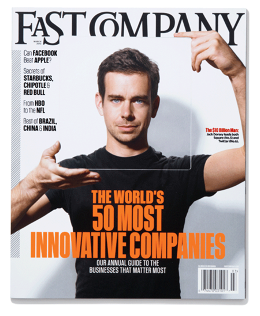
19. Cash Will Disappear.
Carrying a little emergency money around with you has always made sense, even if you ended up tapping that resource for something less than essential. But that need is rapidly dissipating. First there were ATMs (why carry cash around when you can grab it when you need it?), but electronic payments via phones and chips are the wave that will wash away the need for cash entirely. Penny for your thoughts? What’s a penny?
20. We Will All Be Family.
Phones, planes, and televisions have all served to make the world smaller, and the ongoing wave of technological change will only draw us into closer proximity. We will have less license to ignore the troubles (and challenges) in other parts of the globe, and we’ll have a vested interest in maintaining familial peace. Nobody knows how to criticize you quite like your kin—they know your vulnerabilities well—but no one is better at coming to your aid, either. Of these 20 items, this is the one with the largest measure of hope: that our increasing knowledge of and intimacy with one another leads to greater understanding and opportunity for all.
No comments:
Post a Comment